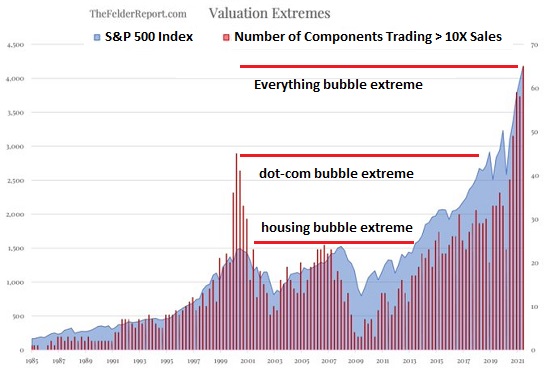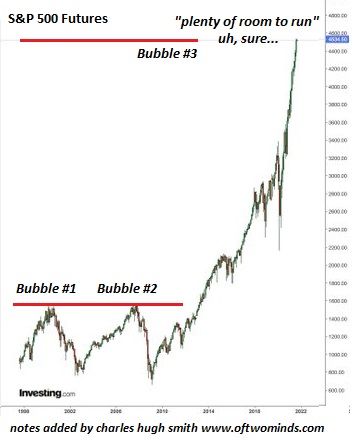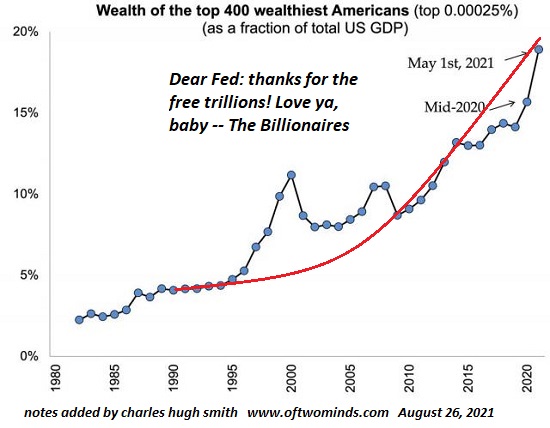Please Don't Pop Our Precious Bubble!
September 8, 2021
It's a peculiarity of the human psyche that it's remarkably easy to be swept up
in bubble mania and remarkably difficult to be swept up in the same way by the bubble's
inevitable collapse.
Allow me to summarize the dominant zeitgeist in America at this juncture of history:
Grab yourself a big gooey hunk of happiness by turning a few thousand bucks into millions--
anyone can do it as long as they visualize abundance and join the crowd minting millions.
Beneath the bravado and euphoric confidence in our God-given right to mint millions
out of chump change, a secret plea lurks unspoken: please don't pop our precious bubble!
The big gooey hunk of happiness available to all depends on one special form of magic spell:
If we don't call the bubble a bubble, it won't pop.
And so Wall Street shills spew endless "research" (heh) proclaiming that the forward price-earnings
ratio of 21.1 will only slightly exceed past norms, and so on--in summary:
If we don't call the bubble a bubble, it won't pop.
What differentiates this bubble from the 1720 South Seas Bubble, the 2000 dot-com bubble or the
2007-08 housing bubble is: this bubble includes every asset class and has sucked the entire
populace and economy into its magic maw.
The bubble has swept up housing, stocks, junk bonds, commodities, cryptocurrencies, NFTs,
and numerous collectibles--the bulk of America's household assets are now firmly lodged in
the maw of the Everything Bubble.
Here is a sampling of recent headlines in America:
I turned $10,000 into $6 million in six months.
My cat turned $6,000 in my RobinHood account into $6 million by walking on my keyboard.
I turned $100 my aunt gave me for the birthday into $6 million in one trade, buying way out of
the money calls on a meme stock.
I turned $23 into $6 million so easily I'm going to sleep my way to $60 million.
OK, so these are slight exaggerations, but the zeitgeist is very real.
Another differentiating factor is the Everything Bubble has no boundaries. Flipping
houses takes work as it is tied to the real-world house being flipped. But NFTs
(non-fungible tokens) have no limits: an NFT can represent/instantiate a rock, photo, chipped
glass, etc., and there are no limits on how many NFTs can be originated.
In the Everything Bubble, it is not surprising that a significant percentage of Americans
have bought NFTs and many view NFTs as legitimate investments equivalent to
cryptos, stocks, bonds and housing.
The only problem with the if we don't call the bubble a bubble, it won't pop
magic mantra is that it has an expiration date. Human greed is unlimited, the number
of currency units that can be issued by central banks is unlimited, the number of NFTs that
can be originated is unlimited, and magical thinking has no limits,
but enough of the assets being inflated in the Everything Bubble have faint ties back to
the real world such that the distortions in the imaginary world of infinite wealth end
up distorting the real world, which is much less forgiving than the imaginary one.
All speculative manias pop, even if no one calls the mania a bubble. The first declines
are bought, as buy the dip has never failed, but since the smart money sold long ago,
there isn't enough dumb money to keep the bubble inflating. Cats walking on keyboards start
generating enormous losses, and all the punters who minted money are torn between
HODL (hold on for dear life, i.e. never sell) or making outsized gambles on long shots that were
guaranteed winners a few months ago.
This continues until the $6 million roundtrips back to $6,000, and then the tax bill arrives:
somehow minting millions accrued taxes that aren't entirely offset by the losses.
Or the margin call exceeds the liquidated value of the account, and the can't-lose punter now
owes the brokerage major money.
But never mind the banquet of consequences currently being laid out: maybe if we all
shout please don't pop our precious bubble! the bubble will never pop and our $6 million
will become $60 million and then $600 million.
In the manic grip of euphoric confidence, it seems impossible the bubble will ever stop
inflating. Every dip generates a rally, and the strategy of rotating out of a weakening
sector into a hot-hot-hot sector will obviously work forever.
It's a peculiarity of the human psyche that it's remarkably easy to be swept up
in bubble mania and remarkably difficult to be swept up in the same way by the bubble's
inevitable collapse. It's incredibly difficult to sell, walk away from the bubble mania and
not look back. That's why so few people succeed in doing so. Those few who do get to keep
whatever big gooey hunk of happiness they tore off during the mania and everyone who stays in
the casino while it burns down watches their big gooey hunk of happiness melt away.
The banquet of consequences is being served, and everyone will attend. What you're served
depends on when you sold.
S&P 500 stocks over 10 times annual sales: please don't pop our precious bubble!

S&P 500 Everything Bubble compared to bubbles #1 and #2: please don't pop our precious bubble!

Billionaire wealth increasing in the Everything Bubble: please don't pop our precious bubble!

If you found value in this content, please join me in seeking solutions by
becoming
a $1/month patron of my work via patreon.com.
My new book is available!
A Hacker's Teleology: Sharing the Wealth of Our Shrinking Planet
20% and 15% discounts (Kindle $7, print $17,
audiobook now available $17.46)
Read excerpts of the book for free (PDF).
The Story Behind the Book and the Introduction.
Recent Videos/Podcasts:
Charles Hugh Smith on Secular Inflation (Host Richard Bonugli, 31 min)
My COVID-19 Pandemic Posts
My recent books:
A Hacker's Teleology: Sharing the Wealth of Our Shrinking Planet
(Kindle $8.95, print $20,
audiobook $17.46)
Read the first section for free (PDF).
Will You Be Richer or Poorer?: Profit, Power, and AI in a Traumatized World
(Kindle $5, print $10, audiobook)
Read the first section for free (PDF).
Pathfinding our Destiny: Preventing the Final Fall of Our Democratic Republic
($5 (Kindle), $10 (print), (
audiobook):
Read the first section for free (PDF).
The Adventures of the Consulting Philosopher: The Disappearance of Drake
$1.29 (Kindle), $8.95 (print);
read the first chapters
for free (PDF)
Money and Work Unchained $6.95 (Kindle), $15 (print)
Read the first section for free (PDF).
Become
a $1/month patron of my work via patreon.com.
NOTE: Contributions/subscriptions are acknowledged in the order received. Your name and email remain confidential and will not be given to any other individual, company or agency.
|
Thank you, Les M. ($250), for your beyond-outrageously generous contribution to this site -- I am greatly honored by your steadfast support and readership. |
Thank you, John M. ($54), for your superbly generous contribution to this site -- I am greatly honored by your support and readership. |
|
|
Thank you, Luke H. ($5/month), for your marvelously generous pledge to this site -- I am greatly honored by your support and readership. |
Thank you, Warren J. ($10/month), for your outrageously generous pledge to this site -- I am greatly honored by your support and readership. |

|